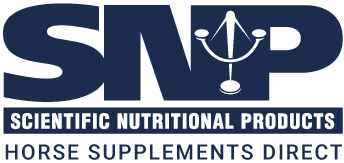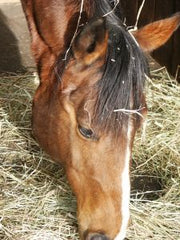Our nutritional advisor and company partner Peter Fishpool is an expert on equine and canine health. Horses and ponies are notorious for their sensitive digestive systems, prone to all-too-common digestive upsets such as colic or gastric ulcers, so in our latest blog we look at how to feed these four-legged creatures sensitively and safely. Peter Fishpool says... "The horse’s unique and sensitive digestive requires nurturing in a domestic environment as modern lifestyle has meant many equines experience more stabled time, less turn-out, richer pasture and increased concentrate feed.
Routine is important for our equines but making small changes to your horse or pony's routine in order to make their feeding process to be as natural as possible can reduce the risk of gut problems such as gastric ulcers and colic. It is vital to remember, unlike us the horse is naturally designed to trickle feed, which means to eat small amounts of food on a regular basis. Over feeding with large meals can be dangerous, just like long periods without sustenance. " Five Digestive Health Tips from Scientific Nutritional Products
- The basis of any equine’s diet should always be forage as this allows the digestive system to function as naturally as possible. Chewing not only allows the teeth to wear correctly but the production of salvia helps maintain healthy pH levels in the gut. Without sufficient forage the acidity of the gut can become too high, risking damage to the stomach lining and the rest of the gastrointestinal tract.
- The horse’s stomach is actually quite small, so it is important to provide concentrate feed on a 'little and often' basis as the equine is only being able to process small portions of food at a time. In addition the stomach actually empties when it 2/3 full regardless of whether the stomach enzymes have completed the processing required so overfeeding is actually counterproductive!
- Horses and ponies require protein, carbohydrate, fat and vitamins and minerals in the diet. Vitamins and minerals are important because they play a multitude of roles within the body including supporting the immune system, bone and teeth structure and they benefit the eyesight and assist in nerve and muscle functioning. A supplement providing vitamins and minerals can successfully complement a natural diet and Scientific Nutritional Products offer Horse & Pony Multivitamin and Competition Horse Supplement which both include a comprehensive vitamin and mineral package completing a balanced diet and boosting nutritional health.
- It is important to choose an appropriate place and time to feed your horse so choose your timing wisely! The environment should be calm and quiet and concentrate feed should only be provided when the horse has returned to normal body temperature and breathing after exercise. Exercise should not be undertaken until at least an hour after consuming a hard feed.
- Finally; routine is vital when protecting equine gut health. Sticking to a regular feeding routine, avoid long durations of exposure to lush pasture and always providing ample hay to avoid the risk of digestive upsets, including colic.


